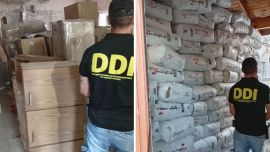The coronavirus pandemic has changed almost every aspect of normal life, from grocery shopping to work, from exercising to socialising. While the changes, brought on by fear of infection and the state-mandated quarantine –– which has been in place in Argentina since March 20 –– are difficult and inconvenient for everyone, for those living with disabilities across Argentina, the virus crisis has posed a unique threat to their ability to access basic healthcare, education and to their own individual autonomy.
Disability is prevalent throughout Argentine society, though that prevalence isn’t always represented in policy-making. No less than 12.9 percent of the population of Argentina lives with a permanent difficulty or limitation, according to an INDEC statistics bureau report of 2010 census data. Additionally, disability is present in 30.6 percent of Argentine households, according to official data.
In recent months, a number of activist organisations have spoken out about the negative consequences of the government’s policies to tackle the spread of the pandemic among people with disabilities in the country.
Implementation
REDI (Network for the Rights of Persons with Disabilities) is an Argentine organisation dedicated to protecting the rights of persons with disabilities. It expressed concerns in a recent press statement that “the social consequences of the pandemic may be worse” than the virus itself for those living with disabilities.
In an interview, Sofia Minieri, a lawyer at the organisation, told the Times that she believes the most pressing issue for people with disabilities right now is access to health services, both related and not related to the coronavirus.
“The government of Argentina has passed guidelines for the proper accommodations of people with disabilities in a way that is respectful of their rights, but so far we are receiving reports of a lack of implementation of these guidelines,” said Minieri.
“People with disabilities often need the assistance of third parties for some activities, such as showering, using the bathroom and eating,” she continued. “However, when they are in hospitals because of Covid-19, many hospitals do not allow access for family members despite the national guidelines. At the same time, members of hospital staff do not provide this assistance, so many people are left in hospitals alone without the assistance they need to eat, to take their temperature and so on.”
Beyond Covid-19 related healthcare, the pandemic and the accompanying lockdown has increased barriers for those trying to access basic health services. This can be more extreme for some, such as those with mental disabilities.
“The situation of people with intellectual or psychosocial disabilities who are institutionalised in neuropsychiatric hospitals is particularly serious,” said Dominique Steinbrecher, a lawyer with the ACIJ (Programme of Rights of Persons with Disability of the Civil Association for Equality and Justice) organisation.
Steinbrecher said that in some cases these hospitals are “not providing adequate personal protection and hygiene elements, not guaranteeing electronic devices to maintain communication with family, partners, friends and legal representatives, and not implementing social distancing measures for the protection of their health and that of the staff of the establishment.”
Efforts are being taken to improve the situation and government officials say that these are unprecedented times. Minieri said that REDI has been working with the National Health Ministry to push for better implementation of the guidelines that are in place. Nevertheless, she described the inability for people with disabilities in Argentina to access the care they need as “unacceptable.”
The Health Ministry in Argentina published recommendations for the assistance and support of people with disabilities on May 20. Among them, the government details methods of Covid-19 prevention for families of people with disabilities, recommendations for healthcare workers in accommodating the disabled community, and a call for accessible information communicated from the government.
The document adds that these measures should be implemented “taking into account at all times their autonomy, participation and demonstration of will, as well as any special requirements that may be requested; including the possibility of removing them from the contexts of institutionalisation.”
Assistance
Argentines with disabilities also face profound challenges outside the healthcare system. Limited access to assistance has posed a threat to the autonomy of people with disabilities, especially those who normally rely on aids for certain activities.
“Many people have said they have to go back to [live at] a family member’s house because they won't have access to the assistance they need to continue to live autonomously,” Minieri told the Times.
These issues are exacerbated by a lack of accessible digital platforms for services such as banking, claiming government benefits, and finding information concerning the national lockdown.
“Many of the web pages of banks or supermarkets, for instance, are not accessible to the blind,” said Minieri, citing an example. She added that these barriers also extend to those working from home and in paying taxes.
ACIJ shares similar concerns. “Although the National Agency for Disability implements some communicational accessibility measures, this is not extended to all state agencies. We are concerned that various state communications –– for example, press conferences which give important information about government decisions or preventive measures –– do not meet the requirements of people with disabilities” Steinbrecher said.
Disability advocates are seeking to call attention to the need for including improved accessibility for digital information platforms such as Argentine Sign Language, subtitling, the presenting of information in easy-to-read formats and other augmentative and alternative modes of communication. Such accessibility needs have long been an issue within Argentina, yet they have become increasingly present amid the Covid-19 pandemic.
Some, however, feel the government has been making progress. Carlos Alberto ‘Beto’ Rodríguez, the president of the Argentina’s Paralympic Committee, believes that the relationship between people with disabilities and the government during lockdown “has been positive.”
The athlete and wheelchair marathon racer argues that the government has been making progress in protecting the wellbeing of persons with disabilities. For example, “the government has allowed people with autism and other pathologies to go out 500 metres from their homes while accompanied,” he told the Times.
Organisations and government agencies have had to work to ensure that people with disabilities are guaranteed equal rights during the pandemic.
Rodríguez detailed how paralympic athletes had “a disagreement” with the Tourism and Sports Ministry over a decree which enabled some Olympic athletes to return to training activities, but did not grant the same authorisation to Paralympic athletes.
“It generated discontent, since only nine percent of the athletes who have the possibility of qualifying for the Tokyo Games are people at risk” from the virus, he said.
The Paralympic athletes resumed training last month, after a new decree was issued.
Education
For students with disabilities, virtual schooling has deepened the inequalities already present in Argentina’s education system.
“It leaves behind those who cannot access an electronic device or the Internet to attend remote classes,” Steinbrecher confirms. “Some measures were taken in this regard, such as the transmission of educational content by alternative means such as television and radio, or the distribution of material in paper format, but they are insufficient to give satisfactory education to people with disabilities.”
According to information from the Education Ministry, a survey carried out by provincial education departments showed that only 12 of the 24 jurisdictions have specific proposals for people with disabilities.
“There are cases when activities are not prepared for students with disabilities, or this is left to the will and work of the support staff, which works disjointedly with the classroom teacher,” Steinbrecher said.
Many accessibility concerns are highly present as information in Argentina becomes more reliant on digitisation, as are inequalities within the education system. While some areas have sought to make virtual schooling accessible to students with different learning needs, many still struggle with access to normal face-to-face schooling.
REDI said in a recent press statement that “virtual education platforms do not always meet appropriate accessibility standards. We must highlight the importance of ensuring access to educational materials in accessible formats, with the adaptations required for students with disabilities who are learning from home.”
Minieri also called attention to the ways in which people with disabilities are often treated in public spaces.
“I think it's important to raise awareness that people with disabilities are not the same as ill people; they can circulate in the streets just like anyone else,” she explained, expressing concern over comments criticising the presence of people with disabilities in supermarkets and other public places during the quarantine.
The lawyer condemns attitudes in society that see people with disabilities as “weak and need to be protected.” This attitude, she said, can show up in “harassment in the streets.”
Future public policy
Argentina’s government has made an effort to include people with disabilities in guidelines during this unique crisis, but experts say they’ve fallen short in ensuring implementation. Amid the pandemic, the disabled community’s fight for equal rights is stronger than ever – and it will continue once life returns to normal.
“The government must include the disability perspective in policy related to the coronavirus and in public policy in general,” Minieri said, explaining that in some provinces REDI is beginning to focus its work back on non-Covid-related advocacy.
Steinbrecher stressed how crucial it is that the disabled community and their perspective are factored into all public policy. For that to happen, their voices must be involved in decision-making. Adequate policies “require consultation and active participation of persons with disabilities and organisations of persons with disabilities in their design and implementation,” she declared.
“The pandemic has exacerbated the violations of rights faced daily by persons with disabilities in their participation in society in all conditions, and made visible the need for a structural change in the approach and adaptation of public policies to international standards set by the United Nations’ Convention on the Rights of Persons with Disabilities,” she concluded.
Steinbrecher laments the fact that “people with disabilities are a group in a situation of extreme vulnerability in Argentina.” She says that’s due to “multiple causes, including the lack of political will, poor distribution of public resources, prevalence of prejudice, lack of information about the situation of the disability community, inefficient state bureaucracies, and the prevalence of policies created using the medical model of disability rather than the social model of disability.”
These two aforementioned models refer to different understandings of disability. The medical model views impairment as a problem located within an individual and sees it as something that must be intervened in, cured or prevented. In contrast, the social model sees a distinction between impairment and disability, and defines disability as the experience of social oppression accompanying an impairment.
With this allusion, Steinbrecher opens up the larger discussion of proper disability policy and inclusion, an issue which often goes under-recognised. The issue should no longer be ignored, during the current health crisis, nor in the future, she concludes.

down


























Comments